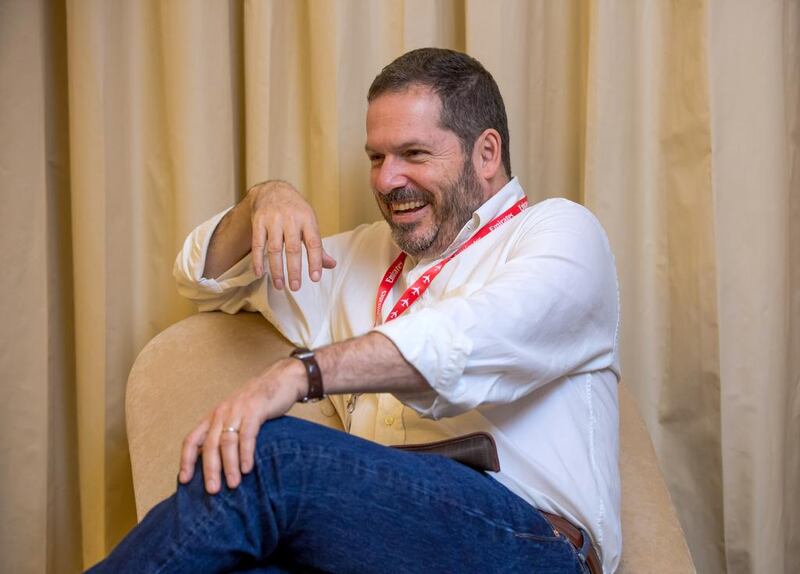As literary giants go, the names don’t get much more sizeable or substantive than that of Ernest Hemingway. For bookish types, seeing a direct descendant of “Papa” present in Dubai – in the form of grandson John Hemingway, was a goose-bump inducing moment.
Due to a logistical mix-up, there were no copies of John's sole book for sale at the Emirates Airline Festival of Literature, so after an hour-long session talking about his Strange Tribe: A Family Memoir, fans instead queued up with copies of his grandfather's novels – of which there were many available. It could have been an awkward moment.
“Some people might get upset about it, but I made peace with that a long time ago,” he says, after being ushered into a private lounge. “In another sense – part of the money they’re spending goes to me, so if I help Ernest Hemingway’s novels sell, that helps the family.”
Brought to Dubai by sponsors Montegrappa, Hemingway, 56, who currently lives in Canada, is nominally in town to discuss Strange Tribe, which was published a decade ago. The book is primarily an account of how the life of his own father, Gregory Hemingway, who passed away in 2001, was warped by being Ernest Hemingway's third child. An eccentric physician diagnosed with bipolar disorder, Gregory was stripped of his licence following issues with addiction. For John, there was an element of setting the score straight.
“He had a bad deal, I didn’t want him to be thought of as some kind of idiot. I wanted people to know what he went through. I wanted to tell the story,” he says. “I was scared – my grandfather killed himself and suffered from clinical depression, and my father was bipolar ... with this kind of genetics, I thought, what does that mean for you?
“It was an effort to try and understand what is going on in this family.”
The book harrowingly tells how Gregory was blamed by Ernest for the death of his mother Pauline Pfeiffer – Hemingway’s second wife – in 1951, and then later shouldered personal blame for Ernest’s suicide 10 years later. When asked in the public talk what he would like say to his father today, John wells up and is left speechless.
And given the same five minutes with his grandfather?
“I’d ask him how he did it – the discipline necessary to be a writer, with the condition he had, the depression, I find that amazing – the guts of it,” he answers.
And surely in some ways that condition – that battle – made Hemingway the writer he was.
“It certainly gave him a different perspective on life, without a doubt, he felt an absolute need to write, to get what’s in his mind on paper – it was a discipline he could not live without.”
John Hemingway was born just 11 months before Ernest’s death. He inherited at least two of Hemingway’s biggest loves – hunting and fishing – in addition, of course, to writing.
Strange Tribe: A Family Memoir was published when John was in his mid-40s. He describes spending the preceding two decades "living, teaching English as a second language, doing translations and writing books that were never published".
While he calls Gabriel García Márquez his favourite writer, he is justly proud of his grandfather’s works, which he warmly recalls reading for the first time in his teens. Just how much of a struggle was it trying to write, with the name Hemingway hovering over head?
“It used to bother me a lot when I was young, before I understood that you can’t write like Hemingway or anybody else, you have to write like yourself,” he says.
“Ernest is up there, he’s got his own thing. That’s not my problem. Ernest doesn’t need my help.”
Nor does he get it, desired or otherwise. While the grandson collects royalties from his grandfather's books, he is not part of the family estate which handles the publishing. When writing Strange Tribe, he was legally prohibited from quoting from Ernest's unpublished work, and takes issue with the form Hemingway's posthumous novels were edited, particularly The Garden of Eden, which appeared in 1986 with, he says, a different ending to the one his grandfather intended.
“He gave instructions to use a certain ending and they didn’t,” says Hemingway. “With a posthumous novel you can’t really say ‘that’s the author’s work’, because there’s no dialectic between the author and the editor. Ernest didn’t have any say at all it was just – boom, it’s published.
“He knew this was going to happen, otherwise he would have destroyed [the manuscripts] – I guess he figured, ‘well, what the hell’.”
John is now working on a collection of largely autobiographical short stories – many about his father and his great-uncle Leicester Hemingway, Ernest’s younger brother – set in Miami, Key West and Havana. He holds hope they will be published later this year, casually dismissing the 10 year gap between books, free from a burden which seems synonymous with the Hemingway name.
“Life goes on,” he adds. “With Ernest Hemingway, or not, life goes on.”
rgarratt@thenational.ae





